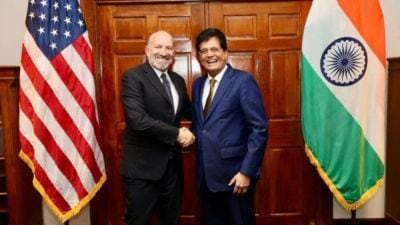Personal milestones beckon both finalists
Top-ranked Roger Federer and nemesis Rafael Nadal dispensed with the last of the preliminaries at the French Open, winning today to set up a much-anticipated showdown in the final.

Top-ranked Roger Federer and nemesis Rafael Nadal dispensed with the last of the preliminaries at the French Open, winning today to set up a much-anticipated showdown in the final.
A sluggish Federer overcame a deficit in every set and advanced by beating Nikolay Davydenko 7-5, 7-6 (5), 7-6 (7). Nadal joined him in the final two-and-a-half hours later, defeating Novak Djokovic 7-5, 6-4, 6-2.
On Sunday, Federer will bid for the only Grand Slam championship he has yet to win, while Nadal will seek to become the first man to win three consecutive Roland Garros titles since Bjorn Borg in 1978-81.
Federer looked lacklustre for much of his semi-final. He committed 45 unforced errors but erased 14 break points, and saved three set points in the last set to reach his eighth consecutive major final, a record.
His bid to complete the career Slam was spoiled at Roland Garros in each of the past two years by Nadal, who won when they met in the 2005 semi-finals and the 2006 final.
The No. 2-seeded Nadal again appears in top form, winning in straight sets for the sixth match in a row despite a strong effort by the 20-year-old Djokovic. Nadal improved to 20-0 at Roland Garros and 33-0 in best-of-five-set matches on clay, and he became the first man to reach three consecutive French finals since Jim Courier in 1991-93.
Nadal won a record 81 consecutive clay matches before losing to Federer in the Hamburg Masters final last month.
Federer is bidding to win his fourth consecutive Grand Slam title, something last accomplished by Rod Laver in 1969. Federer seeks his 11th major title, which would tie Laver and Bjorn Borg for third on the career list. He also can complete the career Grand Slam that eluded such champions as Pete Sampras, Jimmy Connors, John McEnroe, Boris Becker and Stefan Edberg — none of whom won at Roland Garros.
Only five men have won all four major events.
By reaching his eighth Grand Slam final in a row, Federer broke a record originally set by Jack Crawford in 1933-34. “This shows consistency,” said Federer, 25. “It always used to be the biggest problem of my young career, and now I’m the most consistent player. It’s a great feeling being in these big matches over and over. I love it.”
Federer has won 27 consecutive Grand Slam matches, two shy of the record Laver set in 1969-70. His last loss in a major event was to Rafael Nadal in the French Open final a year ago.
Federer improved to 9-0 against Davydenko, but found the three-hour match a struggle from the start. “When you play well, it’s easy,” said Federer’s father, Robert. “When you’re not playing well, those are the big wins, the battles. He battled today. We were nervous. We’re not used to these battles so much.”
Federer fell behind 2-4, love-40 in the opening set before he rallied, repeatedly erasing break points with big serves and breaking in the final game. When the set ended, Davydenko had converted one of 11 break-point chances, and Federer was 2-for-2.
Davydenko kept Federer pinned behind the baseline, and in each of the next two sets the Russian served for the set — then failed to close it out.
The most remarkable see-saw sequence came with Davydenko serving at 5-3 in the third set. During the sloppy 20-point game, Federer failed to convert five break-point chances, and Davydenko squandered two set points, sailing a forehand long each time.
Federer finally broke when Davydenko dumped a backhand in the net. That made him 4-for-15 converting break-point chances.
Davydenko finished 3-for-17 and committed 53 unforced errors. The Russian held one last set point at 7-6 in the final tie-breaker, but Federer hit a service winner. Two points later, Davydenko chipped a backhand wide to give a visibly relieved Federer the victory.



- 01
- 02
- 03
- 04
- 05




























